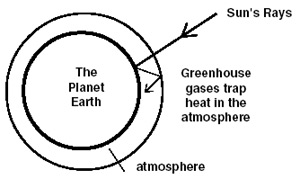
| Glasgow Digital Library | Voyage of the Scotia | BRUCE | PEOPLE | SHIP | ANTARCTIC | INDEX |
|---|

The rays from the sun pass through the atmosphere and release heat when they strike the surface of the Earth. Some of this heat is released into space but much of it is trapped by greenhouse gases - carbon dioxide (from burning fossil fuels and tropical forests), methane (from cattle), dust (from agricultural land, deserts, volcanic eruptions), and water vapour in the form of clouds - and this results in global warming.
The warming of the Earth's atmosphere is causing climatic change all around the world. Sea levels have been rising due to melting ice caps and thermal expansion of the oceans.
The ice cap is being reduced by 4% a year, but as this ice is floating it doesn't contribute to rise of sea level. However, an increase of water in the Arctic Ocean contributes to climatic change and the Northwest Passage is now easier to navigate.
The ice cap is being reduced but only by a very small amount. The ice shelves of the West Antarctic ice cap have been a cause of concern as some of the smaller ones have broken up.
Very low-lying countries are most at threat from a rise in sea level. Some of the coral islands in the Indian Ocean and Pacific Ocean rise only a few metres above the sea. A large area of Bangladesh (the delta of the Ganges) would be flooded by only a very small rise in sea level. In Britain, river estuaries and the Wash would be first to flood if the sea level rose.
The rise in sea level is quite small so far, and efforts are being made to reduce the emission of greenhouse gases, especially carbon dioxide. More efficient power stations and a reduction of the burning of the rain forest would help.
If all the ice on Greenland melted, world sea levels would rise about six metres (20 feet). If all the ice on the Antarctic continent melted, sea levels would rise over 70 metres (230 feet). This is unlikely to happen, but small increases will continue.
| Glasgow Digital Library | Voyage of the Scotia | BRUCE | PEOPLE | SHIP | ANTARCTIC | INDEX |
|---|